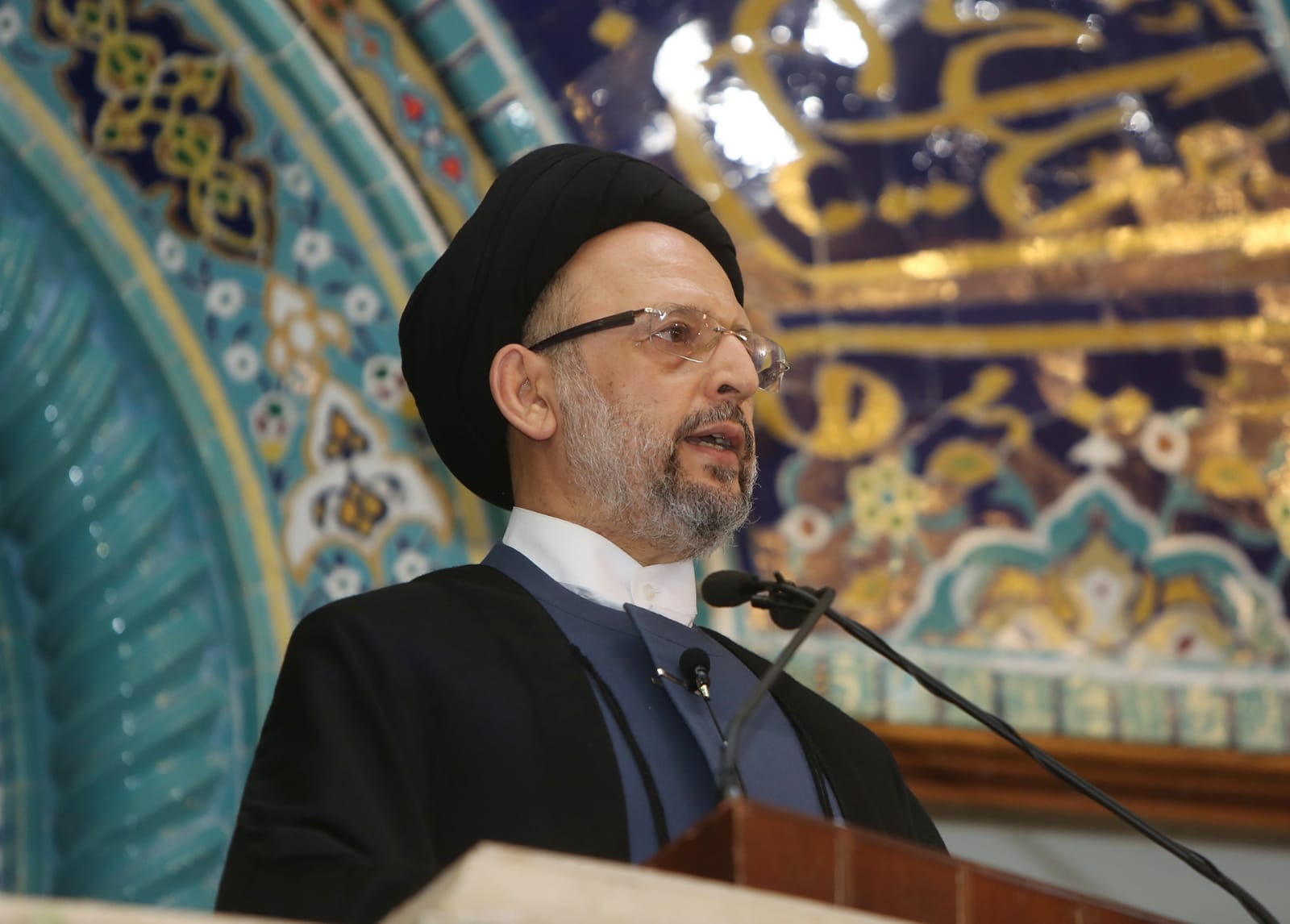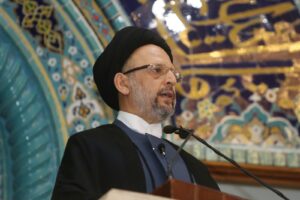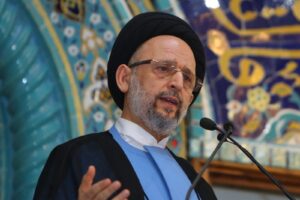The remembrance of Allah
In the name of Allah, the Compassionate, the Merciful
His Eminence, Sayyed Ali Fadlallah, delivered the two Friday prayer sermons at the Imamain Al-Hassanain Mosque; Rabi al-Awal 27, 1447H/Sep 19, 2025. Several prominent religious scholars, dignitaries and hundreds of believers attended the Jumu’a prayer. Following is summary of his sermons
First Sermon
The remembrance of Allah
Allah, the Most Exalted, says in His Glorious Book
O believers! Always remember Allah with much remembrance and glorify Him morning and evening. It is He who confers blessing upon you, and His angels that He may bring you out from darknesses into the light. And ever is He, to the believers, Merciful.
,Allah, the Most Exalted, urged His worshipers, the believers, in this verse (Ayat )and in many others, to make much remembrance of Him — that they remember Him wherever they are and wherever they go, and not restrict their remembrance of Him to special times or occasions: when losing a dear one, when struck by illness, hardship, or trial, or when present in places that remind them of Allah, the Most Exalted.. Rather, they should remember Him while sitting on school benches, while performing their jobs, in the markets, in times of satisfaction and when angry, in times of hardship and weakness, in peace and in war, when judging or dividing, and to remember Him much after every prayer and after performing any ritual act of worship.
O Allah, inspire us to remember You in private and in public, in the night and in the day, in times of ease and in times of hardship. Fill our hearts with the silent remembrance of You, and guide us to the actions that bring Your pleasure.
To this He invited us in the Ayat we recited when He said
{O you who have believed, remember Allah with much remembrance \ And exalt Him morning and afternoon} [Qur’an 33:41–42],
And
And when the prayer has been concluded, disperse within the land and seek from the bounty of Allah, and remember Allah often that you may succeed. Qur’an 62:10..
And in the Hadith from the Messenger of Allah (p.): “Make much remembrance of Allah as much as you can, in every hour of the night and the day, for Allah commanded much remembrance of Him
To this also, the Commander of the Faithful (a.s.) would call upon his Lord, as we read in Du‘a Kumayl:
“O Allah, I ask You by Your right, Your holiness, the greatest of Your attributes and names, that You make my times in the night and the day inhabited with Your remembrance, and connected with Your service, and that my deeds be accepted by You, and make my tongue continuously mentioning You, and my heart enamored with Your love.
The Qur’an warned the believers of the consequences that result from neglecting the remembrance of Allah, or turning away from it, or forgetting Him, when He said:
Do not be like those who forgot Allah, so He made them forget themselves. Those are the defiantly disobedient. Qur’an 59:19
“A person forgets themselves if they forget their Lord, for in doing so they forget their place in life, Allah’s position relative to them, and the role they are meant to fulfill. Another verse points out that turning away from the remembrance of Allah causes people to lose the compass that guides their path in life, leaving them without guidance in this world and blind when they stand before Allah
And whoever turns away from My remembrance – indeed, he will have a depressed life, and We will bring him forth on the Day of Resurrection blind \ He will say, “My Lord, why have You raised me blind while I was [once] seeing?” [Allah] will say, “Thus did Our signs come to you, and you forgot them; and thus will you this Day be forgotten.”} [Qur’an 20:124–126.
That is why He called them not to let wealth or children or any worldly matter distract them from the remembrance of Allah:
O you who have believed, let not your wealth and your children divert you from remembrance of Allah. And whoever does that – then those are the losers. Qur’an 63:9..
The emphasis on continuous remembrance reached to the point that Imam Zain al-‘Abidin (a.s.) considered neglecting it as a sin and wrongdoing that requires man to seek forgiveness from Allah. He used to say:
O Allah, I seek Your forgiveness from every delight without Your remembrance, and from every comfort without Your intimacy, and from every joy without Your nearness, and from every occupation without Your obedience.
All this emphasis on the remembrance of Allah, the Most Exalted, stems from the importance of the role it plays in building man’s relationship with his Lord.
First: It strengthens the relationship of man with Him and affirms His presence in himself. This is what Allah, the Most Exalted, promised: that He will keep looking after him and grant him His care, attention, support, victory, and honor, and to be with him, when He said:
{So remember Me; I will remember you} [Qur’an 2:152],
And in the sacred hadith: “I am as My worshiper thinks of Me, and I am with him when he remembers Me.
Second: It protects man from falling into the suggestions of Satan, his tricks, and false hopes. Allah, the Most Exalted, said in another verse: {And whoever is blinded from remembrance of the Most Merciful – We appoint for him a devil, and he is to him a companion.} [Qur’an 43:36].
Third: It grants man a feeling of peace for his soul, serenity and life for his heart, firmness and strength when facing hardships and challenges. It is impossible for one who remembers Allah not to feel the warmth of His love, compassion, and mercy, and strength and dignity. To this Allah pointed: {, by the remembrance of Allah hearts are assured} [Qur’an 13:28.
It is this that Allah, the Most Exalted, expressed when speaking about His Prophet (p.) on the day the polytheists reached the mouth of the cave where he was hiding with his companion during his migration from Mecca to Medina, when He said
When he said to his companion, “Do not grieve; indeed Allah is with us.” And Allah sent down His tranquility upon him and supported him with soldiers you did not see and made the word of those who disbelieved the lowest, while the word of Allah – that is the highest. Qur’an 9:40….
.
When we speak of the remembrance of Allah, we do not mean what some might think — that it is limited to remembrance by the tongue. Rather, it is the remembrance that springs from the heart, the feeling, and the emotions, uttered by the tongue, and reflected as correction in man’s journey in life.
When we speak of the remembrance of Allah, we do not mean — as some might think — that it is limited to the words of the tongue. Rather, it is the remembrance that flows from the heart, feelings, and emotions, which the tongue expresses and which guides a person rightly in life.
It is narrated from Imam al-Sadiq (a.s.) to one of his companions:
> “Shall I tell you what Allah, the Mighty and Exalted, has most strongly enjoined upon His creation”
“Yes,” he replied.
> “Being just toward people from yourself, sharing with your brother, and remembering Allah in every situation. I do not mean saying *SubhanAllah, Al-Hamdulillah, La ilaha illa Allah, Allahu Akbar* — though this is part of it — but true remembrance of Allah in every situation, whether obedience or disobedience comes upon you.
And in another Hadith
“Whoever obeys Allah has remembered Him, even if their prayer, fasting, and recitation of the Qur’an are few.
O beloved ones: We are in the greatest need, amidst all the reality we live, and the difficulties and challenges we face, to strengthen the remembrance of Allah, and to let it flow upon our tongues — that we do not replace His remembrance with anyone, no matter how high their status or position, and that we always express it in our prayer, our worship, our recitation of the Qur’an, our supplication, our seeking forgiveness, our glorification and saying “La ilaha illa Allah,” and in contemplating His creation. So that we may thereby be more steadfast and protected, and capable of successfully handling the problems of life, and to attain what the rememberers attain of the blessings Allah promised, to which the following supplication pointed:
”
“O my God! You said — and Your Word is the truth —:
‘O you who have believed, remember Allah with much remembrance, and exalt Him morning and afternoon’ [Qur’an 33:41–42], and You said — and Your Word is the truth —:
‘So remember Me; I will remember you’ [Qur’an 2:152].
You commanded us to remember You and promised that You would remember us in return. Here we are, remembering You as You commanded, so fulfill for us what You promised, O He who remembers those who remember Him, O Most Merciful of the merciful..
In the Name of Allah, the Most Compassionate, the Most Merciful
The Second Sermon
Worshipers of Allah, I advise you and I advise myself with the advice of the Messenger of Allah (p.), when he said to the Muslims who believed in his message and what he brought, and to all of us
Be brothers, righteous, loving, united, and mutually supportive. Do not cut off relations, do not turn your backs on each other, do not hate each other, and do not envy each other
“The Muslim is the brother of the Muslim. He does not wrong him, he does not abandon him, he does not belittle him. Every Muslim must respect the life, wealth, and honor of his fellow Muslims. To harm any of these is strictly forbidden by Allah and is a grave sin
So let us hold fast to the advice of the Messenger of Allah (p.), so that we may be the society he wanted: a society of collaboration, unity, and mercy; a society like a solidly built structure, each part supporting the other, each part strengthening the other, where no one transgresses against another. And if a disagreement occurs within it, it does not last long, but quickly vanishes and matters return to their normal course. By that, it becomes stronger and more capable of facing challenges.
And we begin with the Israeli escalation we witnessed recently, which targeted many southern towns, and which led — as happened in the city of Nabatiyah — to the injury of many women and children, even fetuses in their mothers’ wombs, and to the continuation of assassination operations against Lebanese citizens, while the enemy persists in preventing any appearance of life in the frontline border villages.
Its aim behind this is to exert further pressure on the Lebanese state and the Lebanese people to accept its conditions and to achieve its goals from Lebanon, which has become clear are within the framework of its declared project since the establishment of this entity — the creation of Greater Israel.
This calls upon the Lebanese state to perform the required role in facing this challenge: to raise its voice in international forums, to hasten in fulfilling what it promised of a national security strategy that mobilizes all sites of strength it possesses on all levels, so that the Lebanese may feel that they are truly before a state they trust, and that it is capable of protecting them.
Meanwhile, we call upon all the Lebanese, of all sects, and positions, to be more aware of the dangers of what is happening to their country from this enemy, and to realize that this enemy has not worked, and will never work, for anyone’s interest, nor will it ever act for anyone’s account. All the realities that have taken place and continue to take place confirm that it seeks to achieve its project aimed at hegemony, not only over Lebanon, but over the entire region and its resources.
At the same time, we renew our call to the Arab and Islamic states to rise to the level of the challenge that faces them and threatens the security and safety of all their countries, after the enemy has gone to extremes in its targeting that used to reach only Palestine, Lebanon, Syria, or Yemen, to now reach the State of Qatar — and may reach others — as was said by its leaders, without this enemy taking into account its neutral and mediating position, nor the fact that it hosts the largest American base, nor the security and political guarantees it enjoys.
It has become clear that confronting the project the enemy is working on in the region requires the solidarity and unity of this world to face it, considering the capabilities it possesses and the international cover it enjoys, which makes it capable of committing crimes without conscience, law, international courts, protests, or daily demonstrations in all the capitals of the world restraining it, and to strike in every place and any location. This cannot be confronted with the division and fragmentation we witness.
And the Arab and Islamic world is not weak — rather, it possesses many capacities and potentials which, if mobilized and utilized, would make it capable of preventing this enemy from achieving its goals, and even of inflicting defeat upon it.
We had been awaiting, along with all the Arab and Islamic peoples, that what happened recently would lead to a shake inside this world, calling its states to a stance equal to the dangers that face them, forming a strong message to this entity and to all its supporters, making them think deeply before targeting any of its countries, and to reconsider their destructive project for the countries of this world.
“But unfortunately, the decisions fell short of what was needed to confront this provocative and dangerous aggression imposed on the region, stopping at mere statements of condemnation and denunciation, without any practical measures that could be relied upon to deter the Zionist entity..
This once again confirmed the image of weakness this world lives before the challenges it faces, and in turn gave the Zionist entity a motive to continue its aggression
In the face of all that has happened, we reaffirm that we must not give in to the frustration and despair that many have come to know. We must hold on to hope — inspired by the steadfastness of those confronting challenges, making sacrifices, and whose memory we honor today in Lebanon. May this resolve awaken Arab and Islamic awareness and sustain a hope strong enough to thwart the enemy’s plots and aggression.
We return to Lebanon to stress again the importance of strengthening internal unity and removing anything that causes division among its people — divisions we sadly create every day, making this country known as ‘a generator of crises.’ Everyone must leave behind harsh, tense, and provocative language and replace it with calm, rational, national dialogue. And if there is disagreement, it should take place in private, within sincere, objective discussions that prioritize the nation’s interest and help it face the challenges coming from inside and outside.




